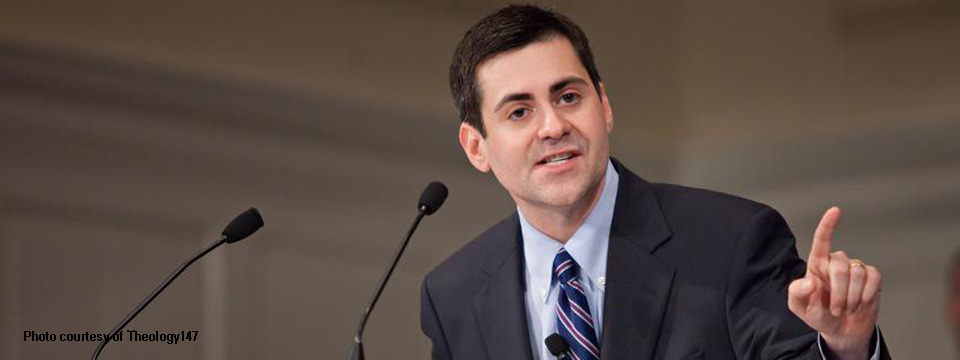
by Ryan Polk | Jul 19, 2013
George Zimmerman was found not guilty of the murder of Trayvon Martin, and the verdict has expectedly led to strong reactions of both agreement and disagreement. There are so many variables involved in this case and the subsequent verdict and certainly no lack of people offering their opinions and editorials regarding race and justice. It’s complicated to say the least and all the more difficult when the tensions of racial issues are involved.
The outcry and commentary from political pundits and racial leaders is to be expected and is somewhat predictable. The question for us, however, is how should the church and Christians think and respond to this event in our cultural history? Personally, this case and the responses to it don’t sit well with me. I am a white father to four adopted children, none of whom are white. I am fearful for them at times.
One of the great difficulties in responding rightly to this case is that while the verdict may have been correct by legal standards, it did not do much to assuage the haunting feeling that justice was not done. The tragedy is not simply that a 17-year-old young man is dead, but it is that he didn’t have to be. There is no way to know the heart or motivation of either George Zimmerman or Trayvon Martin.
As we evaluate we must go by the facts as we know them, just like the jurors did who found themselves deliberating one of the most difficult cases imaginable. Here are some of the important facts…
– Regardless of motive, Zimmerman initiated the events that led to the death of Martin.
– Martin’s actions did not warrant the urgency in which Zimmerman responded.
– Neither Zimmerman nor any vehicle, home, or other person was in imminent danger to necessitate Zimmerman leaving his vehicle to pursue Martin.
– Zimmerman’s course of action stopped being wise when he decided to aggressively approach Martin rather than waiting for the police.
– Martin’s response as a young black teenager being followed by a vehicle and then pursued by a stranger must be taken into account. Historically, it must be admitted that these situations have not usually ended well for the young black man.
– Martin’s wisest course of action would have been to either stay on his phone reporting what was taking place or doing all he could to remove himself from the situation.
– Martin’s aggressive response to Zimmerman’s aggression led to a guaranteed violent encounter.
– At the time of the violent conflict, both Martin and Zimmerman were more than likely (in their own minds) acting in self-defense
My assessment is that the real story is not as one-sided as Zimmerman has portrayed it and that Martin is not as innocent of a victim as the narrative is being crafted. Neither of those opinions alleviate any of the tragedy of an extremely unnecessary death. It is important to make the distinction that Zimmerman was found not guilty but he was not found innocent because he wasn’t. All of our actions have consequences. Zimmerman may have been not guilty of second degree murder or manslaughter under the law, but he is not innocent by any means of actions that put him in a position that led to him taking a life. Martin was certainly a victim, but his actions as well put him in a worse predicament than he needed to be in.
As we try to respond rightly, we must not allow ourselves to fall into the stereotypical responses that so often accompany these types of issues. I would like to offer a few insights that, Lord willing, will help us think well about this…
– There were no winners in this verdict. A 17-year-old boy is dead and didn’t have to be. It is tragic even if the letter of the law was served.
– There is no real reason to take sides. This is not a black/white, left/right, or liberal/conservative issue. We should not view tragedy in terms of winners and losers.
– We make no progress by denying race played a role in this case nor by saying it was the sole factor.
– Christians (of all races) must acknowledge any racism, whether overt or latent, repent and work on crucifying this part of our fallen fleshly humanity.
– Before making quick judgments, those of us who are white, need to try our best to understand why a young black man would feel threatened or what it is like to be viewed suspiciously for no other reason than the fact you are black. The majority rarely understand what it is like to not be the majority.
– Before making quick judgments, blacks need to remember and know that many of us who are white hate racism, want it to end, and are saddened by it, even if we don’t experience it like you have.
– As the church, we should seek to be salt in light in racial issues just as we are to do in all areas of life, and all races need to understand that we were adopted by a heavenly Father who shows no partiality and sees no distinctions and because of that neither should we.
There have been some excellent pieces written on this issue over the past few days. I would wholeheartedly recommend the articles by Al Mohler, Russell Moore, Thabiti Anyabwile, and William Saletan.

by Ryan Polk | May 9, 2013
Do you ever read Mother Jones? It is a very liberal media outlet that is not for the faint of heart. While I agree with very little, if anything, they produce, it is a helpful resource for seeing how evangelical Christians are viewed outside our own circles. It is extremely easy to get lost inside the big world of evangelicalism and forget that people on the outside view both life in general and how we live it in particular quite differently.
Case in point: “Orphan Fever: The Evangelical Movement’s Adoption Obsession” by Kathryn Joyce. As Jonathan Merritt wrote in covering this story for Religion News Service, the gist of the argument is this “as a result of Christians’ efforts to adopt orphaned children, kids who may have been illegally obtained are being placed in oppressive, fundamentalist homes in order for parents to evangelize them.”
Really? Is Christian adoption simply a plot to evangelize children? Russell Moore, president-elect of the Ethics and Religious Liberty Commission doesn’t think so. Merritt quotes Moore saying, “the idea that Christians’ desire to adopt children is a ruse for evangelism is little more than a tired cliché.
Yes, [Christians] believe in rearing our children with instruction in what we believe is the most important part of life: the gospel,” says Moore. “That is hardly unusual. Buddhist parents rear their children with Buddhist values, such as mindfulness and meditation. Secular progressive parents rear their children with progressive values, such as equal rights and fair treatment of all. Why would it surprise anyone that evangelical or Roman Catholic or Pentecostal Christian parents rear their children as Christians?”
To be fair, Christian adoption isn’t perfect. Nothing is. It is, however, an essential movement for believers to live out a consistent and Biblical pro-life ethic, as well as meet the needs of society in general, in order to promote the common good for all, especially those without a home or voice.
I invite Joyce and her ilk at Mother Jones to come and visit my family (I have four adopted children) or my church for that matter (we have nearly 6o adopted children from all over the globe) and see if observing adoption up close and personal would change her opinion. Our home is a lot of things, but oppressive and fundamentalist it is not!
Joyce and Mother Jones have given us a great example of why faithfulness to following God and His Word must be our standard and not the biased, uninformed musings of those who do not even take the time to really learn about what they criticize. Makes you wonder who is really oppressive and fundamentalist.

by Ryan Polk | Apr 10, 2013
In a recent article at the Huffington Post, Frank Schaeffer penned an opinion piece with this provocative title: “All Evangelical Leaders Will Soon Be Doing Gay Weddings”. Continuing with his recent life course, the son of famed Christian apologist and intellectual Francis Schaeffer and the recently deceased Edith Schaeffer (both of which made tremendous contributions to evangelical Christianity during the 20th century), may be more right than we would care to admit.
Only God can discern the heart of Schaeffer and what led him to abandon the evangelical faith of his parents. He has himself tried to chronicle his reasons in his books Crazy for God: How I Grew Up as One of the Elect, Helped Found the Religious Right, and Lived to Take All (or almost all) of it Back and Sex, Mom, and God: How the Bible’s Strange Take on Sex Led to Crazy Politics – and How I Learned to Love Women (and Jesus) Anyway. The titles themselves suggest a biting cynicism as well as give a subtle preview of Schaeffer’s own agenda including the acceptance of homosexuality in general and same-sex marriage in particular.
But could he be right? Not entirely and certainly not for the reasons that drive him to his conclusions. Schaeffer’s cynical reason is ultimately evangelicals will cave on this issue because we are unprincipled charlatans more concerned with surviving and keeping our positions and careers than standing for biblical truth. We are nothing more than mere hirelings who…well, need to be hired and for that to happen we will join the culture. Plain and simple self-preservation.
But Schaeffer grossly misunderstands a movement that he claims to have been a major part of making. If evangelicals cave on the issue of marriage, it will not be for self-preservation but rather a poorly misguided ‘others-preservation’. His father was prophetic in identifying two terribly damaging weaknesses that we as conservative evangelicals tend to suffer from. What are they? Namely, the desire to be accepted by a hostile culture (almost always with the good heart motivation of reaching people not realizing what we are giving away to do it) and the fact that we are rarely ahead of the cultural curve. As Greg Thornbury has rightly written, an apropos description of evangelicals could be “anything you can do I can do later, I can do anything later than you.”
Each of these weaknesses puts evangelicals in the position of being reactive rather than proactive with the truth of the gospel. How many good things usually come from our reaction? Not many. It often forces us into corners that seem unavoidable, hence the issue of same-sex marriage. Since we have allowed culture, for the most part, to set the parameters of the debate we once again find ourselves in a reactive posture. Culture has said it is about consenting adults who want to express their love for another, experience the joy of children, and receive all the benefits of being married. Bill O’Reilly has said that must leave our ‘Bible-thumping’ arguments in the church. They have no place in the courts. And the media and entertainment industries are supposedly convincing us daily that the battle is over. It is simply a matter of when, not if. A reactionary position seems primed and ready to acquiesce (see Rob Bell) and accept the inevitable. If this is true, then Schaeffer is right.
But there is more to the story for evangelicals. One of our defining foundations has been the authority of the scripture. That is the bigger issue at stake for believers in debates over the definition of marriage. It is not a postmodern battle over whose opinion gets to carry the day but by what authority will we live. For those of us who long to be faithful to Christ and his Word that means the scripture is our authority. This means that despite being unpopular or even persecuted we will be found faithful to the one that matters…and it isn’t Frank Schaeffer.

by Ryan Polk | Mar 27, 2013
It seems entirely fitting that on the very day our federal Supreme Court was listening to arguments that would redefine the institution of marriage, the Ethics and Religious Liberty Commission of the Southern Baptist Convention would announce the appointment of Russell Moore to become its next president. As the issues before the Supreme Court attest, our country is in the middle a moral identity crisis. I can think of no one better suited to lead the ERLC and speak to these complex moral issues for Southern Baptists as well as a larger evangelical constituency than Dr. Moore.
Dr. Moore is uniquely qualified for this position. He is an impressive theologian, capable administrator, and passionately concerned about the issues which affect Southern Baptists. He brings a rich experience and background to the position from his time serving one of our seminaries as well as working in the political realm. Equally important, Dr. Moore is a committed family man who has spoken and written often about God’s design and purposes for marriage. He has been one of the primary leaders over the last decade of putting Christian adoption on the map for many believers, a movement he has not only written and spoken on but has also participated in as an adoptive father.
Moore will be 42 years old when he will begin leading the ERLC following the retirement of Richard Land. This fact, coupled with his winsome and engaging personality, allows Dr. Moore to speak to and connect with a younger generation of Southern Baptists and evangelicals. Each generation faces and must answer different moral challenges to our faith. Dr. Moore will be a defender of the positions staked out by Southern Baptists in the past on important issues such as abortion and same-sex marriage as well as newer challenges that need theological and biblical answers such as the need for adoption, bio-ethical concerns, and human trafficking. Moore will be a fresh voice to a new generation of Southern Baptists looking to continue our tradition of engaging the culture.
As the world’s largest protestant denomination, the Southern Baptist Convention needs a dynamic and effective Ethics and Religious Liberty Commission, an organization that will represent Christ and His word faithfully for many Christians in winsome, loving, unwavering way. The ERLC needs to be committed to being the Christian voice on issues that God’s word has spoken. The ERLC also needs to be an equipping center helping churches and Christians engage the culture with truth and the gospel. Dr. Moore seems to be God’s man to lead this essential ministry.
Congratulations to Dr. Russell Moore on his appointment as President of the ERLC and kudos to the search committee for seeking and following God’s leadership.

by Ryan Polk | Jan 17, 2013
How do Christians live faithful and gospel-intentional lives in a culture that seeks to eliminate the uniqueness of the Christian message from the public square? It’s a difficult question that seems to be coming more and more of a reality.
This was seen recently in President Obama’s request for evangelical pastor and speaker Louie Giglio to offer the benediction at the upcoming inauguration. Giglio has been a leader in the Passion Conferences for college students for nearly two decades and a tireless voice to end human trafficking. Then a sermon he preached in the 90’s about the biblical position on homosexuality surfaced, and he was suddenly under fire.
The details are a little murky, but at the end of the day, Giglio was no longer offering the benediction. Words like ‘hate’, ‘bigot’, and ‘judgmental’ were being associated with a man who by all accounts is none of those things.
Sadly, this is becoming far more the norm rather than the exception. University campuses, supposed bastions of free speech, have recently tried to limit Christian clubs and organizations. Some universities have established ‘free speech zones’ as the only areas where free speech can take place. Workplace restrictions regarding religion are common and we are all too familiar with what happens if a political candidate speaks of the role his faith plays in his life.
So what should we do? Maybe the teaching of Jesus can help us through this. In John 15-16, Jesus offers several important reminders for believers living in a world that is hostile to the gospel. We need to remember…
– the world hated Jesus (therefore, we are not alone)
– the disdain for Jesus and by extension His followers comes from not knowing Jesus (therefore the importance and necessity of sharing Christ)
– as followers of Christ, we should expect opposition
– the context and circumstances of our culture’s attitude toward the gospel can’t deter us from our calling of faithfully living and speaking the whole truth of the gospel
May God grant us the grace to courageously and lovingly live out the gospel in our lives and words despite the intolerance of a tolerant culture.




